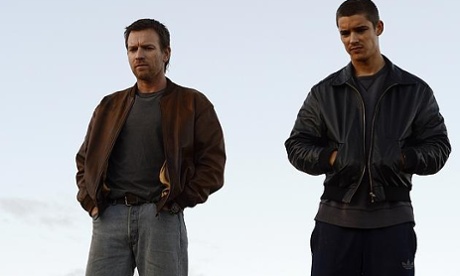
The opening stretch of writer-director Julius Avery’s debut feature film is based in a maximum-security prison where the 19-year-old protagonist, JR (Brenton Thwaites), is given a choice: experience all kinds of heinous assault at the hands of the yeti-like inmates or obtain protection at a cost. That cost is that once JR (doing time for a minor crime) is back outside, he must help a prisoner and his crew escape. No prizes for guessing which option he chooses.
That prisoner is Brendan (Ewan McGregor), a wily veteran thief always planning three steps ahead. Brendan takes notice of our young anti-hero when JR trundles past him in the prison canteen and, with one quick glance at a chessboard, instantly recognises Brendan is three moves from checkmate.
At this point Avery appears to be laying the groundwork to build his primary character into a wrong-side-of-the-tracks intellectual, a sort of green around the edges MacGyver or Walter White-type capable of extricating himself from a tense situation using brainpower alone.
However, like several script components in this technically impressive but inconsistently written debut, these messages are later thwarted. In addition to pursuing a woman he is explicitly advised not to (hardly a rare crime in drama) JR can’t swim, can’t use chopsticks and has the aura of a high school student grudgingly stuck in detention.
Son of a Gun’s plotline moves like comic strip panels, fast and without fine details. The turning points are clearly delineated: once the blokes have busted out of prison they are quickly offered a job (heisting gold) which leads to heated confrontations, interpersonal development between JR and his criminal mentor and a familiar riff on forbidden romance.
There are two chess metaphors. The first, inspired by Bobby Fischer, is about going all or nothing; the second is using pawns as sacrificial lambs, which results in our under-the-thumb protagonist ultimately standing up for himself.
Son of a Gun is silly but fun entertainment marred by slow patches, wonky writing and unempathetic characters. The film’s Western Australian-set heist, involving a gold pour and a four-minute wait for it to solidify, feels surprisingly fresh, and turns into a rollicking car chase with Nash Edgerton playing the getaway driver. It’s good to see Edgerton, director of the criminally underrated 2008 neo-noir drama The Square, on Australian screens.
It’s also good to see McGregor strutting his stuff down under. There is something about his demeanour in Son of a Gun –smug, with a holier-than-thou temperament that feels implied rather than earned – that fits hand in glove with representations of Australian criminals.
Brendan isn’t the big bad wolf (that role belongs to an oily kingpin played by Jacek Koman) and doesn’t have a breakout moment of nastiness. The film avoids presenting him in an overly negative light; instead of torturing a traitor with a hammer he simply puts the bloke in a freezer and retrieves him later, which feels like a PG way of escaping what could have been a grim reality check.
McGregor’s cool cat style plays out as inoffensive, soft-edge characterisation, not exactly the stop-at-nothing hard arse the drama needs him to be. Nor is Brendan the “good” thief, instead caught somewhere between not being likable and not being despicable.
Avery’s direction, despite following the beats of a giddy Hollywood action movie, isn’t really in on the joke; his style aspires to Michael Mann more than Tony Scott. But perhaps the comedy is there in subtle, even subliminal ways. When JR and his lover get it on in a toilet on a train the director cuts to a long low angle horizontal shot of the vehicle extending across tracks and curving a little to the right – a sleazy twist, perhaps, on the loaded visual symbolism of Hitchcock’s Strangers on a Train.
Son of a Gun moves diligently between set pieces but paints itself into a moral corner, where a happy ending for the gun-toting bandits feels not just illogical but also undeserved. This debut filmmaker doesn’t do enough to build sympathy for JR, and when his story eventually loops back to the character’s supposed chessboard genius, the connection feels tenuous at best. Still, it’s handsomely packaged, smartly paced and shows off Avery’s potential.

